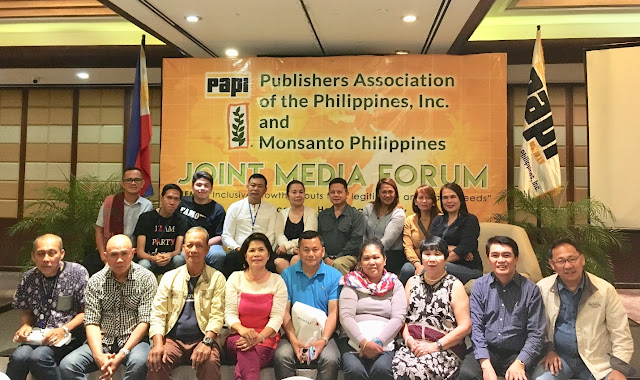Monsanto Philippines urged for the support of the
government to help address the proliferation of illegal Bt corn seeds during a
recently held media briefing at Marco Polo Hotel, Davao City. During the media
briefing, company officials stressed that the sale and planting of illegal
seeds pose a threat to farmers and the entire corn industry.
Dr. Gabriel Romero, Regulatory Policy and Scientific
Affairs Lead of Monsanto Philippines elaborated on the increased incidence of
counterfeit seeds and its emerging threats to the country’s corn industry.
“Adulterated seeds or fake seeds directly affect our farmers. The seeds may be
low-priced but they are also of low-quality. Worse, they come out without
proper stewardship measures, and thereby threaten GM technology and farmer’s
livelihood,” he explained. “We want to put an end to this concern, as it sets
in danger the very livelihood of our corn farmers as well as the corn
industry,” Dr. Romero added.
At present, more than 10% of Philippines’ Bt corn seeds are
produced illegally by unauthorized companies. These seeds are produced with BT
and RR traits but are sold to the market as “conventional seeds”. According to
a survey in 2015, farmers who used counterfeit seeds observed a significant
decrease in their yield and negative net income brought about by issues like
smaller grain, unfilled ear and higher susceptibility to pests.
Counterfeit seeds, Romero shared, are commercialized
without “refuge” in a bag. The agricultural firm appealed to the regulators to
help address this issue as absence of refuge in counterfeit seeds may put the
GM technology at risk. He added that
observing the “refuge system” is an important requirement to keep pests such as
corn borer from becoming resistant to Bt corn.
Meanwhile, Ms. Charina Garrido-Ocampo, Corporate Affairs
Lead of Monsanto Philippines highlighted the company’s effort in promoting
modern agriculture to address the country’s food challenges and environmental
sustainability. “Agricultural biotechnology can help us achieve food security.
It is not a silver bullet which can solve all food-related concerns, including
the lack of food, but it offers a solution which we should be open to,” Ms.
Ocampo stressed.
The briefing was conducted in partnership with the
Publishers Association of the Philippines (PAPI) and was attended by key
members and officers of its Mindanao Chapter.

No comments:
Post a Comment